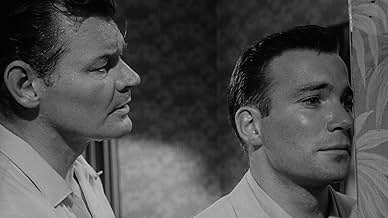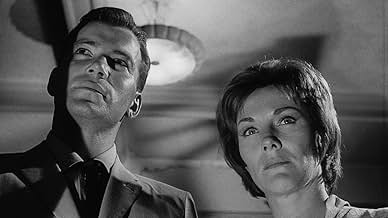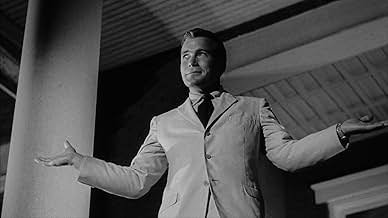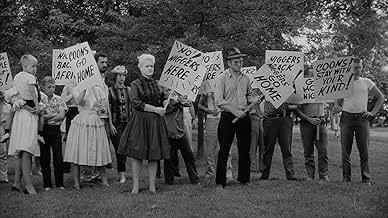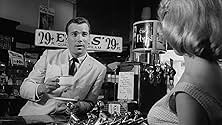एक चमकदार सफेद सूट में एक आदमी एकीकरण की पूर्व संध्या पर एक छोटे से दक्षिणी शहर में आता है. वह खुद को समाज सुधारक कहता है. लेकिन वह जो करता है उससे मुसीबत इतनी बढ़ जाती है कि वह नियंत्रित नह... सभी पढ़ेंएक चमकदार सफेद सूट में एक आदमी एकीकरण की पूर्व संध्या पर एक छोटे से दक्षिणी शहर में आता है. वह खुद को समाज सुधारक कहता है. लेकिन वह जो करता है उससे मुसीबत इतनी बढ़ जाती है कि वह नियंत्रित नहीं कर पाता.एक चमकदार सफेद सूट में एक आदमी एकीकरण की पूर्व संध्या पर एक छोटे से दक्षिणी शहर में आता है. वह खुद को समाज सुधारक कहता है. लेकिन वह जो करता है उससे मुसीबत इतनी बढ़ जाती है कि वह नियंत्रित नहीं कर पाता.
- Bart Carey
- (as William Nolan)
- Jack Allardyce
- (as O.C. Ritch)
- Old Hotel Clerk
- (वॉइस)
- (अपुष्टिकृत)
- Billy Lee
- (बिना क्रेडिट के)
फ़ीचर्ड समीक्षाएं
In a confrontation scene between Shatner and Leo Gordon the tension builds to a magnificent and believable ending. Each actor and actress is wonderful. The local townsfolk come across as the real thing.
This is a movie about racism that does not have a filter. Nothing is corrected to protect the ears of the viewer and listener. Not all white folks are bad or stupid or anything. This was an era. These are the kinds of people we might find dealing with a national issue. Some of the people black and white wanted integration and some were opposed and some were violently opposed.
I don't think there is a more accurate movie about the times represented here. There are bigger budget movies.
This one is too bold for TV. Maybe the internet will bring it back to some top ten lists. Well worth watching.
Daring, bare bones, raw, insensitive, necessary, superb. And flawed. And terrific.
It's what a good movie strives to be--saying something, sucking you in, chewing you up, leaving you impressed and interested and glad.
Where to start? Rather than mention the main actor, it's better to say that here is a rare film, a low-budget black and white drama, that deals with racism in the early days of de-segregation directly. It mostly shows the bigoted South--the map on the wall implied Missouri, so it's not even the deep South of Alabama. When ten black children are told by Federal law to attend the white school, the town has largely and bitterly gone along. It's the law. But a troublemaker comes in to stir things up, and we see a caricatured but not so wrong impression of the worst sides of ordinary people who grew up thinking segregation was normal and good.
That actor? William Shatner, of Star Trek legend (beginning in 1966). Here he shows he can pretty much act. I say pretty much as a kind of compliment to the movie makers, especially the big force behind the film, its look and its theme, Roger Corman. Because this is no Brando or Newman coming in to really command the town, the movie, the racial injustice. That would be too impressive, and with Shatner we have something is almost what you picture really happening. The rest of the movie is no documentary, for sure, and so the need to be cinematic and theatrical is met. The cast is a gritty, drawling bunch of regular folk, and my guess is that Southerners didn't appreciate the typecasting. But I've lived in a small Southern town much like this one, and it is not so far from the truth. Simplified for the movie, but the general drift is there.
The themes (segregation, racism, etc.) are clichés, kind of, and a little uncomplicated, but if you think of when the movie came out you can appreciate how it might have resonated then. It's not a masterpiece of slick filmmaking, not at all, but it's a masterpiece in some other sense of high drama, fast editing, and pertinent material. It was shot in several locations in Missouri. To compare them even briefly to the high profile films about race and racism, many of them starring Sidney Poitier, you can see how polite and restrained those films are, and how really afraid they are. This one is above all fearless. It hams, it exaggerates, it uses stereotypes, it ignores human complexity. But it works. Very much. See it.
Corman indulged in a form of guerilla film-making to make a statement that he felt needed to be made. Corman, the cast and the crew were thrown out of two locations, worked under constant threat of physical violence, and wrapped this lean, tight, morality play in a grand total of three weeks. Most of the cast had literally NO acting experience. Does it show? Occasionally - but in the end the odd representations of some of the extras in the mob only adds to the film's realism.
The Intruder is a story which examines the ease with which a charismatic leader with a pernicious all-consuming hunger for power can exploit fear to rally otherwise normal people into irrationality, violence and hatred. William Shatner stars as Adam Cramer, a northern hate-monger who has just arrived in the small southern town of Caxton to sow the seeds of racial violence just as the town has begun to integrate its schools in compliance with federal law. Cramer preaches non-violent resistance, but is unwilling to stand in the way when his followers escalate the issue in their own way. His powerful and dramatic speaking ability and his cunning turn most of the town's white minority against their black neighbors, culminating in his orchestration of a vicious frame-up of an innocent student.
Cramer is, in one way or another, behind almost everything that happens in this film. Yet the film does not permit facile scape-goating of this single sociopath. Rather, it indicts ignorance in general, and racism, hatred and intolerance much more specifically. Amazingly, it does so without exploiting stereotypes of southerners, yankees, blacks, whites, or anybody else. The Intruder deals with its subjects without reducing them to anything that could be wholly represented or analyzed in the hour and half of intense drama the film gives us. Instead, the Intruder leaves its subjects wide-open and raw. If you view this film about once every 6 months, you might just take something different away from it each time.
I do not believe the rumor that Roger Corman has ever, in any way, suggested that William Shatner's performance destroyed this film's box office potential. In interviews, Corman has consistently given Shatner a great deal of praise for his award-winning portrayal of evil incarnate. And rightly so. Shatner is nothing short of incredible in this film. He clearly dedicated everything he had to this film, and it shows. Other noteworthy performances are given by Frank Maxwell, Robert Emhardt and Charles Barnes.
The film is pristinely directed - lean and economically edited, even for Corman. The cinematography is straightforward and clean. And the locations are entirely appropriate - another Corman trademark.
Possibly the best truly low-budget film I have ever seen. Would-be film-makers, even some established big-budget purveyors of modern junk-food-film should learn a great deal from a careful study of the Intruder.
This is Corman's most painstakingly worked-out film, which is why it is so powerful, suggesting, like Lang, a set of mathematical propositions that seem simple but, add up to a theorem that seems to negate mathematical principles of logic, order etc. As in a Lang film, there is no 'hero' to root for - the lead here is a sinister right-winger linked to the KKK who arrives in an archetypal Southern town to stir up race hatred. He is given the conventional Hollywood hero treatment: the opening credits set up his point of view, establishing his way of looking at the world.
But even over these credits, Corman confuses us. At first we think he's a solitary figure, it is him alone we see entering the town and looking at it. Then he comes out with a woman and child, and we assume he's a family man, but that turns out to be wrong too. So, in these opening scenes we are presented with a lead character in the conventional manner, but, unconventionally, we are unable to get a grip on him.
Similarly, in spite of the title and the menacing opening music, Cramer's good manners and charm continue to suggest him as a hero, even though he is trying to stir up racist feeling, especially when compared to the next significant male character, a loud braggart who appears to be raping his nymphomaniac wife. In this first third, there are no sides drawn, we might almost be watching a racist film, such is Cramer's conventional heroic status. He even seems a movie star, with his dark shades and good looks, which Corman plays on ironically in the scenes of demagogary and when his 'fans' protest his jailing.
Like Lang, Corman switches point of view disturbingly and decisively. This opening out of point of view makes clear the issues, and in a way that conventional Hollywood cinema of the time could not conceive. The reason films like this were considered 'B' or exploitation is because they were telling truths that official Hollywood didn't even know existed. How many contemporary Hollywood films were even dealing with these issues, never mind as provocatively and intelligently as this one? When they finally got round to it, it was cosy liberal kramergloop.
There is no flip solution here - the moral centre is a moderate racist who is nearly killed for his growing ethical awareness (the newspaper editor) - other liberals are shown to be almost criminally useless. Corman asks questions with no easy answers - how do you enforce progressive laws? how do you hold back a mob without becoming as reactionary as them? Cramer, influenced by Lenin as much as Hitler, makes his appeals to democracy and freedom, and Corman forces us to admit that he is right, to reconsider what we mean by these concepts. This is a stunning film, full of tense calm giving onto explosions of harrowing violence, with an insight into its roots in sexual neurosis, including a sequence where the KKK come into town like an invading army, a huge cross like a tank turret, ready to be burned; a lynch sequence as shocking as Huck Finn or 'The Ox-bow Incident'.
Along with the unusual, Langian clarity of the monochrome imagery, note the grids on or around Cramer - crossed telegraph wires, the bars of the hotel lobby etc. - culminating in the demand for the accursed rapist behind a grilled window, like a frothing beast; or the childlike immaturity of the racists, whose hatred centres around the school's swing. The frightening 'speech' scene, outside a monumental civic building, in Nuremberg-like lighting, is more potent than anything in 'All the King's Men'.
So forty years later I watched the Intruder. It left me cold and I begin remembering that trip to the South so long ago. Sitting here in my easy chair in South Carolina today, I can say that some things have changed and some things haven't.
The movie, at least from my experience, presents a milieu that is faithfully true of the South in the early '60's. Of course, it descends from that point into the murky depths of the manipulation of fear and hatred within the human spirit. It is a raw, dramatic expose - hard to watch at times. And I can't respect enough that this movie is so cutting edge and so truly represents the attitudes and motivations of folks during those days.
For the adventurer who has a curiosity of how life was in that period, and for the psychology buff who is interested in the roots of human nature, this movie is a must.
dnk
क्या आपको पता है
- ट्रिवियाAfter the crew was thrown out of East Prairie, MO, by the chief of police (for allegedly being "communists"), Roger Corman realized that he needed one more wide shot of the high school. He and an assistant went back into the town and hurriedly filmed the shot. The chief must have gotten wind of his being there, as he was seen by Corman arriving in the distance. Corman and his assistant quickly threw the camera and equipment into their car, and sped away in the opposite direction, unscathed.
- गूफ़At the beginning of Adam Cramer's speech in front of the town hall, he unbuttons his jacket twice.
- भाव
[last lines]
Sam Griffin: [to Adam Cramer] Boy, you're gonna get grass stains all over those trousers you don't get up. Come on. That's better. I figure your work in this town's about over. If you hurry, you can catch the bus to Farragut. They got trains there. If you're a little light on travelin' money, I'd be proud to... You're sure, now? Oh, I almost forgot. These belong to you. I wouldn't wanna steal from you, boy.
- कनेक्शनFeatured in Some Nudity Required (1998)
टॉप पसंद
- How long is The Intruder?Alexa द्वारा संचालित
विवरण
बॉक्स ऑफ़िस
- बजट
- $90,000(अनुमानित)
- चलने की अवधि1 घंटा 24 मिनट
- रंग
- ध्वनि मिश्रण
- पक्ष अनुपात
- 1.85 : 1
इस पेज में योगदान दें



